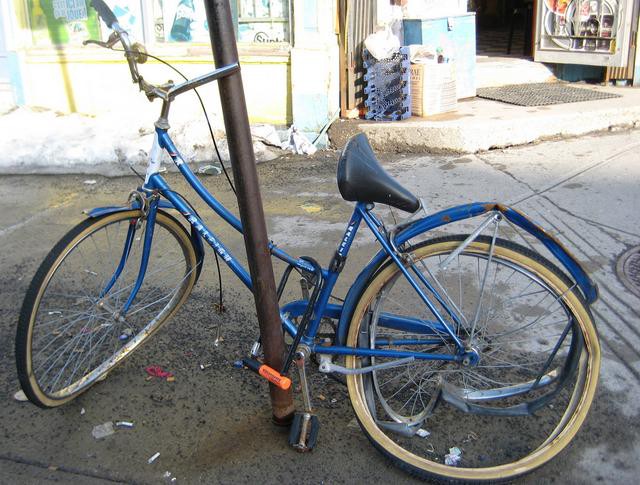Man Struck By Bike

Columbia professor and New Yorker contributor Samuel G. Freedman writing on the biker threat is a healthy exercise in empathy. For example: If you got hit by a bike — pretty hard — could you imagine formulating and remaining sympathetic to this series of arguments?
There are the racers who careen along the park’s six-mile loop, treating it as their private velodrome. There are the tourists who blithely pedal the wrong way, or in the wrong lane, or both simultaneously, despite the clear markings on the roadway. There are the everyday bikers who ignore traffic signals, stop signs, and crosswalks. In the rare instances when I’ve seen a cop around, he or she has done nothing about any of it. Every time I have run these past few years, I have had the anxious sense of watching a game of Russian roulette in which the chamber with the bullet would eventually slip into place and a biker would maim or kill a pedestrian.
Russian roulette kills someone approximately one in six times a turn is played. It also kills the player. Which I guess actually works here, because bikers are vastly more likely to be smeared into the pavement by a car than they are to cause the death of a pedestrian. Not that bikers haven’t killed people; Freedman describes two.
These tragedies lay bare two realities of what we might call bike culture in New York City. First, many bicyclists routinely ignore all traffic laws, signs, and signals. Second, the city has made inadequate efforts in recent years to enforce those laws, and thus to protect the rest of us.
Follow the law in a car in New York City and you’re pretty well guarded against death. Or don’t! You’re still safer than anyone else on the road. Follow the law on a bike, however, and you’re not necessarily safe at all: you will find your “bike lanes” full of cars, both stopped and moving; you’ll notice quickly that people don’t notice you; you’ll realize that the cars around you either don’t know you’re there or, if they do, actively resent your presence, not because they’re afraid of you but because they’re annoyed that they might accidentally kill you. It is within this context that the biker is mindful of the law, the enforcement of which, regarding cars’ interactions with bikes, suggests that it doesn’t really matter; it is within this context, then, that the biker appears to flout it, or actually does. It is within this context that the biker is an asshole.
To put it statistically, New York City’s Department of Transportation recorded three hundred and nine crashes between bicyclists and pedestrians in 2013, an increase of more than twenty-five per cent from the two hundred and forty-three such collisions in 2012.
To put it statistically, there were three hundred and nine crashes between bicyclists and pedestrians in 2013, the same year that 286 people were killed by cars. A few blocks west of the park where Freeman no longer feels safe from bikers is a remarkably fatal stretch of West End Avenue near 95th, where, this year, two pedestrians were stuck and killed by four-wheel conveyances over the course of one hour. A week later, a few blocks away, another death.
Part of the current problem, I think, derives from bicyclists’ sense of themselves as victims.
Part of the current problem, I think, derives from bicyclists’ actual victimization, which produces a sense of victimhood.
If you feel aggrieved, if you have been injured, if you mourn at the ghost-bike shrines of bikers who have been killed by cars, then you may have a difficult time realizing that you can simultaneously be the aggressor.
The constant threat of death might cloud your awareness of all things that are not your death, that is possibly true.
And there is another element, I suspect, to bicyclists’ self-righteousness and the de Blasio administration’s inadequate response. To ride under your own power on two wheels is to be admirably green, to be on the sustainable side of the angels.
It is, and it is, as well as promoting the convenience and health of the entire city and all who live in it.
Four wheels fuelled by hydrocarbons are easier to see as a potential danger needing to be controlled. But there is no mandate of heaven for putting passersby at mortal risk. And there is no public-policy logic to giving a free pass on public safety to someone who is not polluting the air.
Here is an objective that doesn’t align with what I imagine “public-policy logic” means: Obsessing over the equal enforcement of safety laws, the violation of which produces, for one party, drastically less severe personal results and drastically more severe external results.
One of the social compacts of living in a large city is sharing public space in a mindful way. That is why we listen to our music on headphones instead of boom boxes. It is why we stand on line for our morning coffee and bagel. It is why we give up our seat on the subway to the pregnant lady and apologize right away if we step on somebody’s shoe entering the elevator. Civility can be a fragile membrane, instantly replaced by confrontation or violence or death, even on a brightly lit afternoon, even in the park.
The social compact: That is why we listen to our music on headphones instead of boom boxes. It is why we stand on line for our morning coffee and bagel. It is why we give up our seat on the subway to the pregnant lady and apologize right away if we step on somebody’s shoe entering the elevator. It is why we ride bikes or subways or buses or our own feet instead of clumsy three-ton air conditioners, in this crowded and small place.
